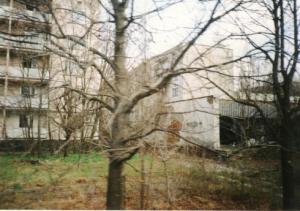Nuclear accidentsBelarus’s lax approach to nuclear safety raises fear of another Chernobyl
Thirty years after Chernobyl, the world’s worst nuclear accident, a series of mishaps at a nuclear facility in Astravets, in Belarus, has raised concerns over nuclear safety, especially in neighboring Lithuania. Vilnius, the country’s capital, is located less than thirty-one miles from Astravets. Lithuania, accusing Belrus of Soviet era-like lack of transparency, says it would work with the international community to block the Astravets plant coming online.

Pripyat, Ukraine, deserted following Chernobyl disaster // Source: commons.wikimedia.org
Thirty years after Chernobyl, the world’s worst nuclear accident, a series of mishaps at a nuclear facility in Astravets, in Belarus, has raised concerns over nuclear safety, especially in neighboring Lithuania. Vilnius, the country’s capital, is located less than thirty-one miles from Astravets. RFE/RL reports that in July, a nuclear reactor shell had been dropped while being moved. Local resident Nikolai Ulasevich, who is a member of the opposition United Civic Party, posted on his Facebook page that the 330-ton shell had fallen from a height of 2-4 meter in preparation for installation.
Two weeks later the Belarusian Energy Ministry confirmed that an “emergency situation” had occurred at the construction site. It said that the incident took place at the warehouse facility, as the reactor was being moved.
Rosatom, the Russian state-owned company which is the nuclear plant’s main contractor, denied the reactor shell had been damaged in the fall, and said it will be installed as planned after supervisors give their permission.
These assurances notwithstanding, the Belarusian deputy energy minister Mikhail Mikhadyuk has said that the installation of the reactor shell was suspended until additional safety checks could be performed.
Lithuania did not hide its irritation with Belarus. The country’s foreign minister, Linas Linkevicius, said the Soviet era-like lack of transparency by Belarusian officials was unacceptable. “These incidents, happening from time to time, lack of transparency, we’re learning about them from open sources, usually too late…. This is not how it should be in reality. This last incident when a nuclear reactor vessel was possibly damaged is very dangerous,” he said.
RFE/RL notes that Belarus is investing in nuclear power in an effort to lessen Belarus’s dependence on Russian-supplied energy. Currently, about 90 percent of Belarus’s gas imports come from Russia.
Analysts note, though, that the plant at Astravets is being built by Russian companies and Moscow is jointly financing the project, at an estimated cost of between $5 billion and $22 billion. Unit 1 of the construction is due to come online in 2018 and Unit 2 in 2020. Two other reactors are scheduled to be completed by 2025.
Soviet deja vu
The silence by President Alexander Lukashenko has angered many in Belarus as well.
Yury Varonezhtsau, a physicist and former parliamentary deputy, told RFE/RL: “For me it’s a natural deja vu, as if I travelled back in a time machine a quarter of a century when we were investigating the causes of the Chernobyl disaster. Then, it was the same, but the difference was it was a totalitarian state, the Soviet Union, and now it’s the supposedly democratic government of Belarus.”
Other critics say Belarus has not properly performed an environmental-impact study for Astravets. One example: The power plant will draw water for its cooling reactors from – and release the warmed water back into — the Nevis River, which is one of the main sources of drinking water in Lithuania.
There were other accidents at the construction site, and all the previous accidents were accompanied by ba refusal of the Belarus government to divulge any details.
In April, the structural frame of the nuclear service building at the site collapsed. According to the report by the Belsat independent TV station, site supervisors, under pressure to meet a fast-approaching deadline, ordered workers to pour too much concrete, causing the structure to collapse as a result of the additional weight.
The Belrus refused to comment on the accident, and a spokesman at the plant denyed anything had happened, even when shown videos of the collapsed structure. In May, the Belarusian energy ministry admitted an “incident” had occurred at the site, but that the “defect” had been dealt with.
“All in all, we are really not satisfied with the process so far, and also we believe this is not just a bilateral problem, it’s a regional [problem] and we would like to internationalize it as much as possible,” Linkevicius said. He noted that Lithuania agreed to close its own Ignalina nuclear facility as part of its 2004 accession agreement with the EU.
Lithuanian president Dalia Grybauskaite said in late July that Vilnius would work with the international community to block the Astravets plant coming online if Belarus failed to adhere to international safety standards at the site.
The International Atomic Energy Agency (IAEA) director-general Yukiya Amano has said that the nuclear agency “has worked closely with Belarus on all aspects of this major project and will continue to offer every assistance.” He said with two reactors under construction, Belarus “is one of the most advanced of what the IAEA calls ‘newcomer’ countries.”
